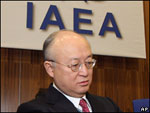 AFP: The head of the UN atomic agency hit out Monday at Iran’s refusal to grant access to sites and scientists involved in suspected nuclear weapons research, as Western powers looked to turn up the heat on Tehran. By Simon Sturdee
AFP: The head of the UN atomic agency hit out Monday at Iran’s refusal to grant access to sites and scientists involved in suspected nuclear weapons research, as Western powers looked to turn up the heat on Tehran. By Simon Sturdee
 VIENNA (AFP) — The head of the UN atomic agency hit out Monday at Iran’s refusal to grant access to sites and scientists involved in suspected nuclear weapons research, as Western powers looked to turn up the heat on Tehran.
VIENNA (AFP) — The head of the UN atomic agency hit out Monday at Iran’s refusal to grant access to sites and scientists involved in suspected nuclear weapons research, as Western powers looked to turn up the heat on Tehran.
International Atomic Energy Agency chief Yukiya Amano called on Iran to open up “without further delay” the Parchin military site where “powerful tools” could detect traces of covert activities despite Tehran’s suspected clean-up work.
Speaking at the start of an IAEA board of governors meeting where Western nations want Tehran censured, Amano said that in a string of meetings and visits to Iran this year, the two sides had been “going round in circles”.
“This is frustrating because, without Iran’s full engagement, we will not be able to start the process to resolve all outstanding issues, including those involving possible military dimensions to its nuclear programme,” he said.
Iran says its nuclear programme is for peaceful purposes and denies IAEA accusations, set out in a major report last November, that until 2003 and possibly since, it had a structured programme aimed at getting the bomb.
Iran has also continued to expand its enrichment of uranium, which can be used for peaceful purposes but also in a nuclear weapon, despite multiple UN Security Council resolutions calling for an immediate suspension.
The Security Council has also imposed four rounds of sanctions on Iran, measures that have been augmented by additional US and European Union restrictions this year that have severely hampered Tehran’s oil exports.
Iran’s arch foe Israel, the Middle East’s sole if undeclared nuclear-armed state, has refused to rule out an military action, and media speculation has heightened considerably in recent weeks that such a strike might be imminent.
The IAEA’s latest report on Iran last month said it had doubled enrichment capacity at its Fordo facility, a site dug into a mountain near the holy city of Qom and seen therefore as difficult to destroy.
The centrifuges currently in operation at Fordo — the number of which has not increased — are used to enrich uranium to a purity of 20 percent, a short step from producing the 90-percent material needed for a bomb.
At Parchin, one of the sites mentioned in the November IAEA report, Amano said Monday that activities seen there by satellite “will have an adverse impact on our ability to undertake effective verification there”.
“We have powerful tools to find and trace indicators of the activities. Nevertheless we can know for sure only when we visit the site and take samples,” he told a news conference.
Western countries hope to use this week’s IAEA meeting to turn up the pressure further still on Iran by getting the agency’s 35-nation board of governors to approve a resolution sharply criticising the Islamic republic.
One Western envoy told AFP that he was “reasonably optimistic” that even Russia and China, seen as softer on Iran, would agree to some sort of resolution — the 12th in nine years.
This would however stop short of referring Iran again to the Security Council, diplomats said.
The IAEA board was expected to discuss Iran on Wednesday. Other topics included improvements to nuclear safety following the March 2011 Fukushima disaster in Japan, as well as North Korea and Syria.
Britain, France and Germany were said to be leading the effort in Vienna after EU foreign ministers meeting in Cyprus at the weekend discussed imposing more unilateral sanctions on Iran.
Iran held its first talks in 14 months in April with the “P5+1” — Germany plus the five permanent members of the Security Council, the US, China, Russia, France and Britain — in Istanbul, followed by meetings in Baghdad and Moscow.
But in the Russian capital in June the talks were downgraded to working level and the process appears to be deadlocked, at least until after the US presidential election in November.
Canada last week closed its Tehran embassy and ordered Iranian diplomats expelled, prompting Iran on Monday to brand Ottawa’s government as “extremist” and as “boundlessly defending international Zionism”.


